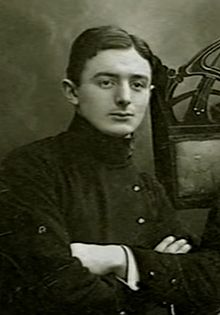Dziga Vertov | |
|---|---|
 Vertov (a.k.a. David Kaufman) in 1913 | |
| Born | David Abelevich Kaufman 2 January 1896 |
| Died | 12 February 1954 (aged 58) |
| Nationality | Soviet |
| Occupation(s) | Film director, cinema theorist |
| Years active | 1917–1954 |
| Notable work | Kino-Eye (1924) A Sixth Part of the World (1926) Man with a Movie Camera (1929) Enthusiasm (1931) |
| Spouse | |
| Family | Boris Kaufman (brother) Mikhail Kaufman (brother) |
Dziga Vertov (Russian: Дзига Вертов, born David Abelevich Kaufman, Russian: Дави́д А́белевич Ка́уфман, and also known as Denis Kaufman; 2 January 1896 [O.S. 21 December 1895] – 12 February 1954) was a Soviet pioneer documentary film and newsreel director, as well as a cinema theorist.[1] His filming practices and theories influenced the cinéma vérité style of documentary movie-making and the Dziga Vertov Group, a radical film-making cooperative which was active from 1968 to 1972. He was a member of the Kinoks collective, with Elizaveta Svilova and Mikhail Kaufman.
In the 2012 Sight & Sound poll, critics voted Vertov's Man with a Movie Camera (1929) the eighth-greatest film ever made.[2]
Vertov's younger brothers Boris Kaufman and Mikhail Kaufman were also noted filmmakers, as was his wife, Yelizaveta Svilova.[3] He worked with Boris Kaufman and cinematographer Mikhail Kaufman on his most famous film Man with a Movie Camera.
- ^ Peter Rollberg (2009). Historical Dictionary of Russian and Soviet Cinema. US: Rowman & Littlefield. pp. 731–735. ISBN 978-0-8108-6072-8.
- ^ "Sight & Sound Revises Best-Films-Ever Lists". studiodaily. 1 August 2012. Retrieved 1 August 2012.
- ^ McClane, Betsy A. (2013). A New History of Documentary Film (2nd ed.). New York: Bloomsbury. pp. 42, 47.